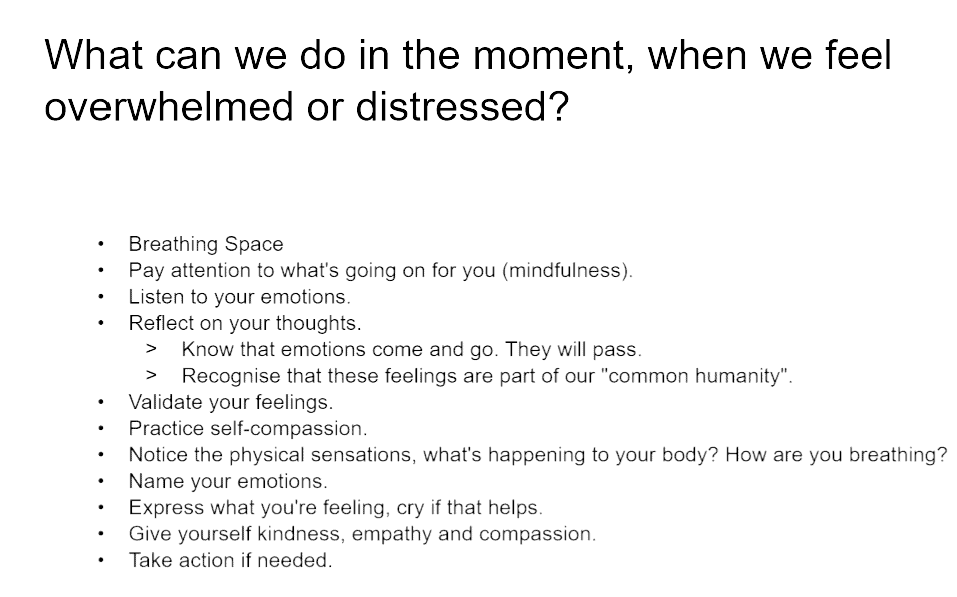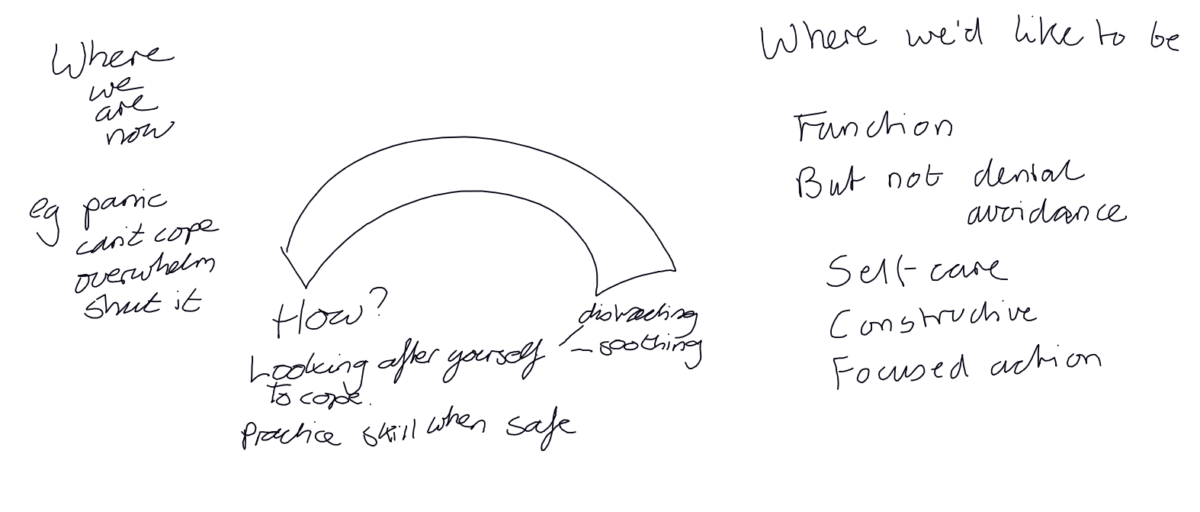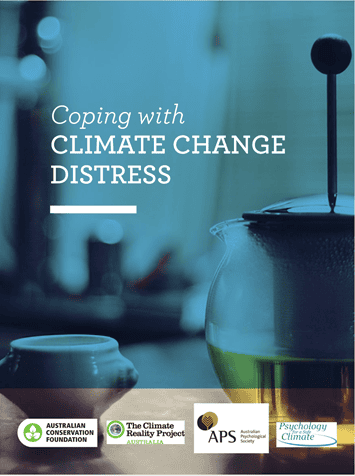This page was created for the participants in one of our Climate Conversations. Responses are edited for clarity and anonymity. They represent the personal feelings and opinion of participants around that topic. They are not intended to be used as a source of factual information, they are not fact-checked and there may be errors and inaccuracies.
Rescources: Managing news consumption
Resources: Climate distress
Conversation guide: Climate distress
Feeling overwhelmed by the news
For this conversation, we were interested in what we could do at the moment we felt overwhelmed. However, a lot of the advice from professionals and experts is entered around ways of managing your news consumption to avoid getting into that situation in the first place. You can find some of those strategies for managing climate distress and news consumption on this resource page.
The news is frequently distressing and sometimes it can be too much, provoking a strong emotional reaction. In this session we talked about our personal experiences of being overwhelmed by the news, we looked at some techniques for managing climate distress, and talked about the process of change.
Have you felt overwhelmed by the news? What was it like for you?
We began by thinking of our experiences of being overwhelmed:
- Learning about Drax power station. If we can’t fix this can we fix anything?
- The production of crude oil in Nigeria, and how so many are living in awful conditions versus a wealthy man.
- It’s so sad.
- The corruption.
- The Congo diamond mine and the child soldiers.
- I wept.
- I think “Let’s just not have diamonds”.
- I feel overwhelmed.
- I can’t feel anger anymore for the big stuff.
- I feel helpless. I don’t want to hear any more.
- I get disheartened rather than overwhelmed.
- The closest I got to overwhelmed was when George Floyd was murdered.
- I was angry.
- I was upset that so many didn’t understand why people were angry.
- I became sensitive.
- I was critical of others.
- Hurt.
- It’s hard to move on.
- I think about how the news is designed.
- It happens so often it’s hard to know, it might have been the fires in Greece.
- Horror and feeling for the people affected.
- At the same time, it’s abstract – it’s happening somewhere else to someone else.
- It is emotional but not visceral.
- I can’t do anything about it. Except reach out when someone I know was affected.
- Videos from the fires are like horror films. It’s terrifying.
- I’m sure we’re not weird having these reactions.
- I can’t remember a specific feeling but it happens a lot.
- Despair.
- Sinking feeling.
- It comes back again and again. Both thinking about it and feeling the emotions.
- I try to think of solutions. I feel I have to do something but know it’s not really possible.
Our reflections:
- Even if you’re going to do something who do you turn to? The authorities? They are as likely to come for you.
- There are too many problems.
- I’m eternally trying to be optimistic. The environment is going mainstream. People know what you’re talking about.
- It’s overwhelming. The climate is bigger-picture stuff, beyond our everyday experience. It’s like the difference between weather and climate.
What can we do when we feel overwhelmed? What the experts have to say.
Psychotherapist Rosemary Randal and her co-creators of Living with the Climate Crisis, say:
It’s important to recognise that these distressing feelings are normal. They originate in the threats that surround us. They are an appropriate response and don’t mean there is something wrong with you.
They also say:
It’s important not to deny this kind of pain. Listening to it and giving it space is usually the best way to move past its intensity and live with its beat more creatively. It will never go away completely but if you see it as an opportunity to reshape your life and live differently you will gradually find a place that can still hold hope, meaning and joy.
Rosemary Randall and others, The Carbon Conversation’s Guide to Living with the Climate Crisis Participan’s Handbook
On a slide, we had a list of suggestions for things we could do when we felt overwhelmed, drawn from all this professional advice. However, when we looked at the list it was overwhelming. It was hard to imagine how they would be useful in a moment of panic.

So, we pivoted a little and talked about how developing these kinds of responses might take time and need to happen in tiny steps. A little like building a bridge between where we are now (e.g. panic, overwhelmed, ) and where we’d like to be (e.g. able to function but not in denial) It might be helpful to start by making a safe space for ourselves, where we could practice without causing ourselves distress, and slowly and gently build up our ability before trying it out when we are feeling panic or other strong emotions. In the meantime, distracting and soothing activities can help us cope during moments when we feel overwhelmed while we think about or build up alternative ways of coping if we decide that’s something we want to do.

What do you think or feel at the end of today’s conversation?
- Not relief but it’s a weight off sharing this kind of thing. It’s important to talk to people who feel the same or similar.
- I like sharing stories, and the list. I’m not bothered about the last bit. I used to get excited about ideas but I never put them into practice. I’m sick of being me but I don’t feel I can change it.
- The last bit was the most useful and pertinent. It got me thinking about strategies I can use.
- I feel a bit flat. It feels a bit messy. It’s good that people can say when stuff doesn’t work for them.
- It’s good it fits the model (Panu Pihkala’s Process model) we use.
Slides
Useful resources
Coping with Climate Distress

The Australian Psychological Society has produced a brilliant booklet called Coping with Climate Distress that contains several strategies for coping with climate distress including:
- Find social support among your friends, groups and community.
- ‘Cognitive strategies (thinking about our thoughts and beliefs).
- Restore yourself mentally.
- Learn to regulate emotions.
The booklet also includes strategies we’re familiar with for coping the the climate crisis including taking action, taking a break and looking after our general well-being.
References and sources
A list of the materials I used to prepare for this session:
Wray, Britt. “How to Take Breaks from the Climate Crisis without Living in Denial.” Substack newsletter. Gen Dread (blog), January 25, 2023. https://gendread.substack.com/p/how-to-take-breaks-from-the-climate.
Pihkala, Panu. “The Process of Eco-Anxiety and Ecological Grief: A Narrative Review and a New Proposal.” Sustainability 14, no. 24 (January 2022): 16628. https://doi.org/10.3390/su142416628.
Australian Psychological Society. “Coping with Climate Distress.” Accessed August 14, 2024. https://psychology.org.au/getmedia/cf076d33-4470-415d-8acc-75f375adf2f3/coping_with_climate_change.pdf.pdf.
“Coping with Distressing Events in the News.” Accessed August 14, 2024. https://www.mind.org.uk/information-support/tips-for-everyday-living/coping-with-distressing-events-in-the-news/.
https://www.apa.org. “Media Overload Is Hurting Our Mental Health. Here Are Ways to Manage Headline Stress.” Accessed August 14, 2024. https://www.apa.org/monitor/2022/11/strain-media-overload.
Hendriksen, Ellen. “How to Deal with News Overload | Psychology Today.” Accessed August 14, 2024. https://www.psychologytoday.com/us/blog/how-to-be-yourself/201710/how-to-deal-with-news-overload.
Climate Change and Happiness. “Season 3, Episode 18: Finding Your Place and Digging In.” Accessed May 31, 2024. https://climatechangeandhappiness.com/episodes/season-3-episode-18-finding-your-place-and-digging-in.